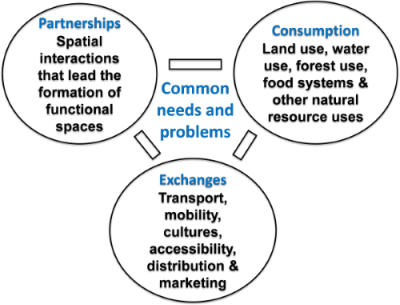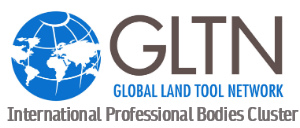News in 2020

|
FIG and GLTN-International Professional Bodies Cluster activities
August 2020
Three main areas of activities
UN-Habitat/Global Land Tool Network (GLTN) has structured its 80 partners in four different clusters. FIG,
together with AUS, are currently co-lead of the International
Professional Bodies Cluster, represented by Rafic Khouri and Diane
Dumashie.
During 2020, the Professional cluster is involved in three
different activities within the GLTN agenda:
- Urban Rural Land Linkages
- Valuation of Unregistered Land
- Arab Land Initiatives
2020 has turned out to be a very different year than what we
expected, and ongoing global and regional events have influenced the
cluster activities; this has led to a lack of cluster updates in recent
months. The continuing uncertainty on what events and conferences would
take place and in what format is continuing and this has influenced the
plans and progress of the activities. Each of the activities are still
being carried through but with changes to plans and a slight delay in
delivery. All activities should have been finalised by the end of
September but have been extended to end of year 2020.
Here is a short overview of the progress and the planned changes for
the Professional Cluster activities:
1. Urban Rural Land Linkages
Background and aim:
To date, many development and research institutions are now working
towards strengthening urban-rural linkages. These agencies include the
World Bank, OECD, FAO, IFAD, UN-Habitat, IIED, UNFCC, EC and many
others. These institutions call for the urgent need to plan, design and
implement integrated policies and programmes within the urban-rural
continuum as compared to the traditional binary approach of focusing
only in urban or rural contexts. They argue that urban and rural spaces
offer different but complementary assets and strengths and better
integration of development interventions is needed to ensure better
socio-economic performance. However, land being central in the
development discourse and in the ‘spatial’ aspects of development is not
well articulated in the debates nor it features as a key “core”
component of urban-rural linkages discourse. There is a need to reverse
this situation and the development of a conceptual framework on
urban-rural land linkages becomes a necessity. This task is taken by
GLTN professional cluster, in collaboration with partners from the
academic/research cluster and key experts and land stakeholders and
involves a scoping of existing work in this topic, understanding its
relevance to the over-all sustainable development agenda, identifying
key challenges as well as potential opportunities, discussions and
consultations with experts, and finally, offering a robust conceptual
framework.
Progress update:
- FIG commission 7 is leading the project, with the support of
commissions 8 & 9.
- A full draft has been produced by Dr Eugene Chigbu, lead
consultant and chair international research at GLTN.

Source: draft URLLs document – Dr Eugene Chigbu
- Due to COVID-19 restrictions, an online consultation strategy
has been developed (first one on 7th of August) with experts.
- Originally, consultations and debate were planned to take place
at the yearly FIG Commission 7 meeting – which in line with so many
other events have been cancelled in a physical format and will be
transformed to an online meeting. Instead workshops in English, French
and Spanish are being planned.
- These meetings will take place online, multi-language and
multi-time zone as 2-hour specific workshops. These workshops will take
place between 20 and 22 October
- A final Urban Rural Land Linkages is planned to be published by
the end of the year.

FIG Commission 7 Annual Meeting will be online between 20 and 22 October
and is open for all who are interested. The theme of the meeting is
Building community resilience: Urban-rural land linkages and strategies
to deal with COVID-19. A central part of the online event will focus on
workshops to discuss the GLTN draft urban-rural land linkage framework
currently underdeveloped.
We encourage you to participate in the meetings.
More information
2. Valuation of Unregistered Land – manual
Background and aim:
With the support from professional organisations and land and valuation
experts, UN-Habitat, RICS, FIG and GLTN have developed and launched the
publication on “Valuation of Unregistered Lands: A Policy Guide”. The focus of the Valuation of Unregistered Land initiative is to produce
a practical manual that operationalises the 2018 GLTN policy guide and
creates a robust, practical framework for land valuation within this
difficult sector (acquisition) in line with existing international
standards such as IVSC (International Valuation Standards Council) and
ILMS. Valuation is a
critical element of functioning land administration systems and this new
manual should provide a key enabling tool for prospective land-based
financing and fair compensation initiatives. This publication provides
key principles and policy guidance for people to progressively undertake
valuations of unregistered lands based on available evidence and data.
It is intended to assist in the achievement of professional level
valuations of unregistered lands and enable users of this guide to
discern how and when this has been achieved. The expert group expects
that field-based lessons learnt and workable solutions will be
documented and add to a body of knowledge that helps influence regional
and national manuals on how to better value unregistered land in the
future, and significantly contribute to sustainable development
objectives. The manual serves to strengthen the implementation of the
continuum of land rights a key tool to strengthening security of tenure
for all. Governments, policy makers, the valuation industry,
practitioners, capacity development institutions and other interested
parties should use this manual to help achieve the SDG goals of conflict
prevention, food security, gender equity, justice and sustainable urban
and rural development.
The final goal is to produce a practical manual bringing the GLTN policy
guide into practice and action. The demand is clear that there is a need
and justification to practically implement the policy guide. This
activity will require further consultation with professional
organisations and experts on land and land valuation. It will need to
further hone the final output for practical use and make certain that
the manual is developed in a participatory way. The manual will be
robust and global, based on agreed standards of best practice, due
diligence protocols and expert collaboration. The activity will also tie
up with existing similar initiatives (GLTN Land based financing
initiative) and will bring multi-disciplinary experts in the
consultation process.
Progress update:
- FIG
commission 9 (valuation) is leading the project
- Expert
working group (the latest online meeting was Friday 31st July 2020) is
close to finalising a pre-consultation draft document.
- After
consensus, the open, global consultation will take place online. An
online masterclass is planned for early September as part of the
consultation process.
- A
comprehensive draft manual is under circulation, and
- We expect
a final review manual late October, ready for delivery to GLTN Dec 2020.
If you would like to take part in the open consultation, expert review
and/or forthcoming masterclasses and outreach events please contact
jkavanagh@rics.org
3. Arab Land Initiative projects
Background and aim:
Good land governance is an important area of attention for the Arab
region. The increase in armed conflicts and social unrest witnessed in
the past decade is rooted in various issues, including land. Land
administration in the Arab countries is still largely using conventional
approaches hence the need to introduce the concept of “fit-for-purpose
land administration” in order to meet the needs of people and their
relationship to land, to support security of tenure for all and to
sustainably manage land use and natural resources.
Progress update:
- Rafic Khouri, AUS, has attended the Cairo meeting where the 9
organizations with which GLTN had signed contracts attended.
- He also participated in the online workshop entitled “Towards a
Postgraduate Program in Land Governance Serving the Needs of Lebanon and
Other Middle Eastern Countries”, organized by the Lebanese University in
mid-June.
- Currently, he is reviewing the translation of a trilingual
glossary about land-related terms (English, French and Arabic)
Further information:
4. Advocacy and collaboration
- FIG is collaborating with Stand for Her Land campaign, Diane
Dumashie is in contact with FIG members
- GLTN is contributing via GLII, to the FIG Task Force on the
SDG’s. In GLII lead role on monitoring it is aiming to align with
FIG activity.
Louise Friis-Hansen
28 August 2020



























